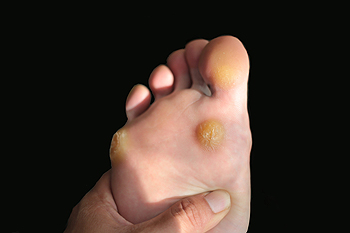 Patients who have experienced corns on their toes are often aware of the pain and discomfort they may cause. A corn is defined as a portion of skin that has thickened as a result of excess friction. This can happen when shoes that are worn do not fit correctly. Common places for a corn to develop can be on the inside or top of the toes, in addition to the bottom of the feet. Some patients find moderate relief when the foot is soaked in warm water, followed by using a pumice stone to gently remove the corn. For severe or stubborn corns, it is suggested that you seek the counsel of a podiatrist who can guide you toward the correct treatment options.
Patients who have experienced corns on their toes are often aware of the pain and discomfort they may cause. A corn is defined as a portion of skin that has thickened as a result of excess friction. This can happen when shoes that are worn do not fit correctly. Common places for a corn to develop can be on the inside or top of the toes, in addition to the bottom of the feet. Some patients find moderate relief when the foot is soaked in warm water, followed by using a pumice stone to gently remove the corn. For severe or stubborn corns, it is suggested that you seek the counsel of a podiatrist who can guide you toward the correct treatment options.
If you have any concerns regarding your feet and ankles, contact Dr. Scott Peters of Ankle & Foot Walk-In Clinic. Our doctor will treat your foot and ankle needs.
Corns: What Are They? and How Do You Get Rid of Them?
Corns can be described as areas of the skin that have thickened to the point of becoming painful or irritating. They are often layers and layers of the skin that have become dry and rough, and are normally smaller than calluses.
Ways to Prevent Corns
There are many ways to get rid of painful corns such as wearing:
- Well-fitting socks
- Comfortable shoes that are not tight around your foot
- Shoes that offer support
Treating Corns
Treatment of corns involves removing the dead skin that has built up in the specific area of the foot. Consult with Our doctor to determine the best treatment option for your case of corns.
If you have any questions please feel free to contact our office located in Mayfield Village, OH . We offer the newest diagnostic and treatment technologies for all your foot and ankle needs.
